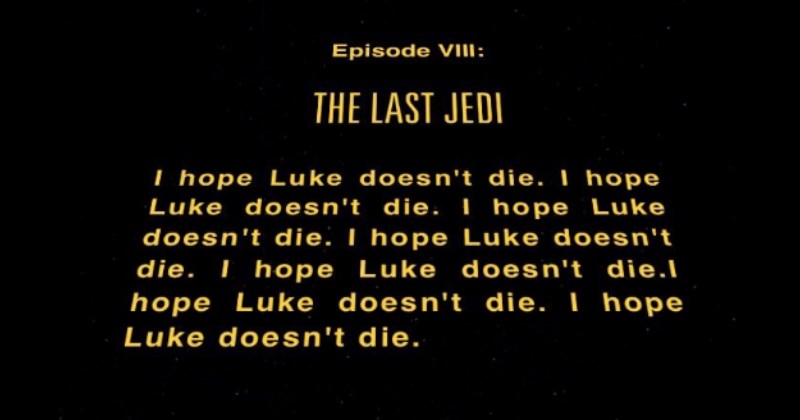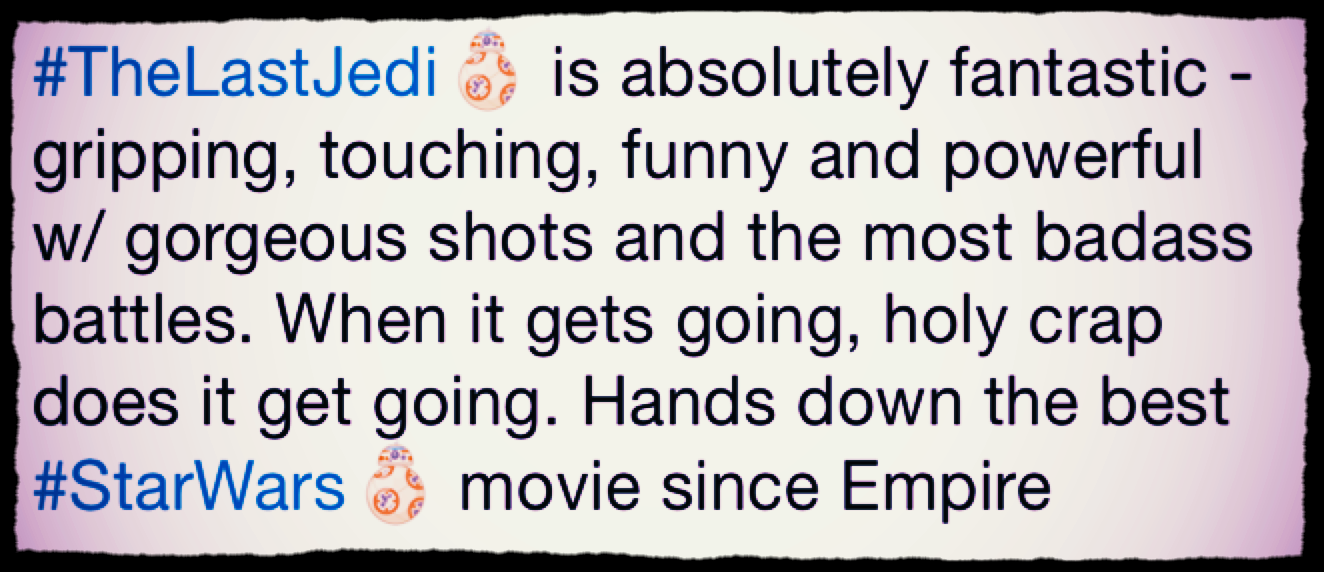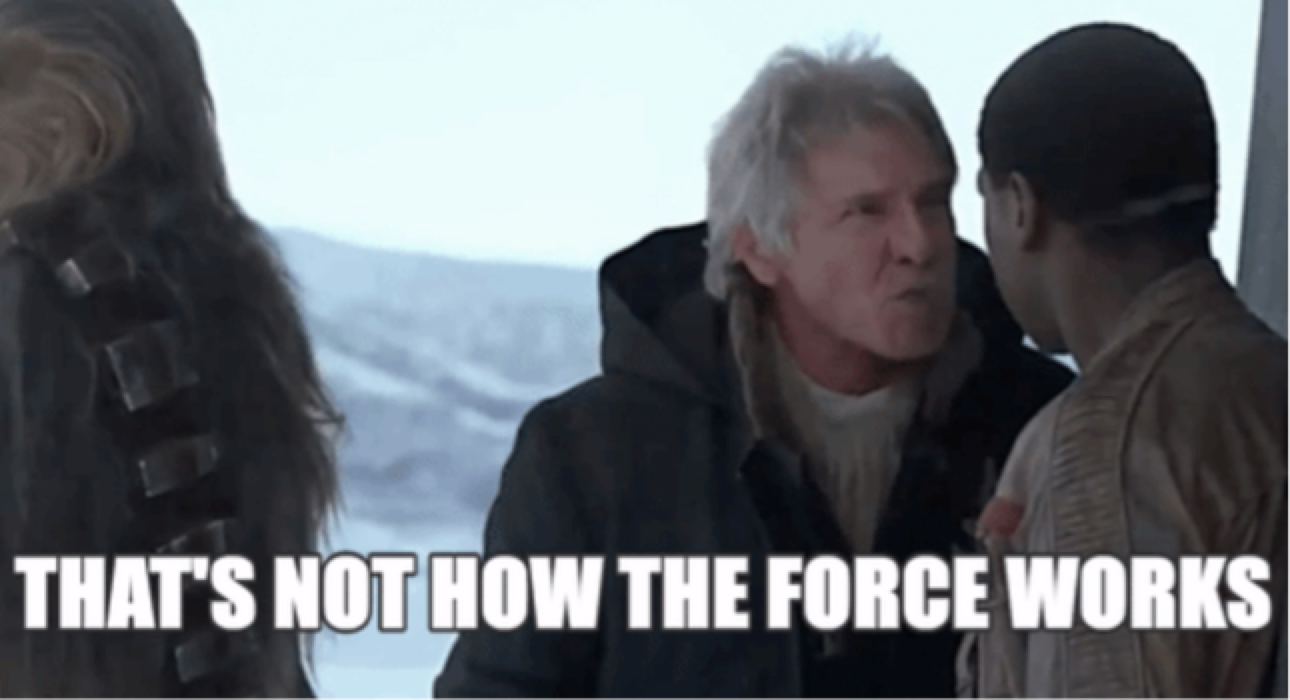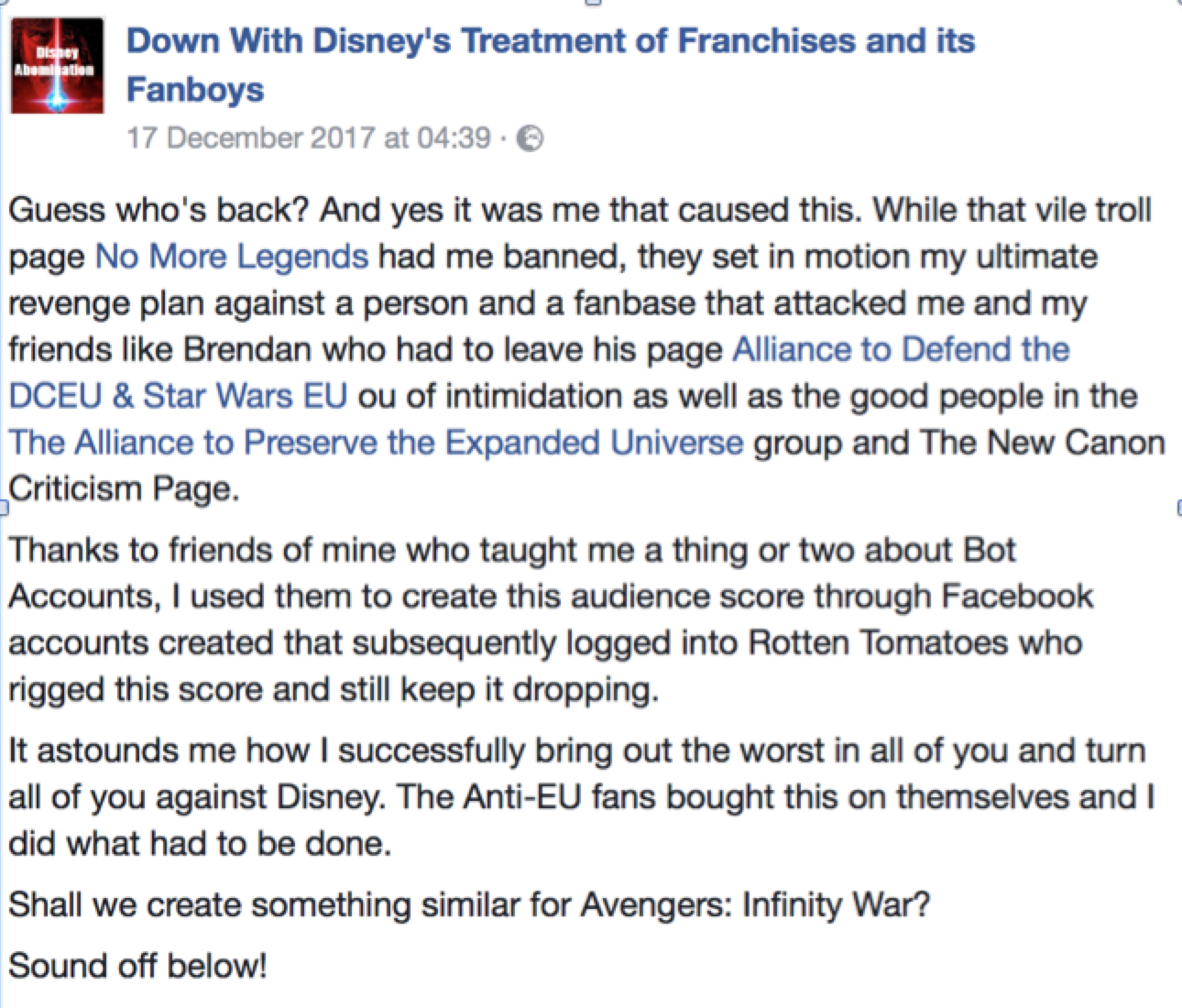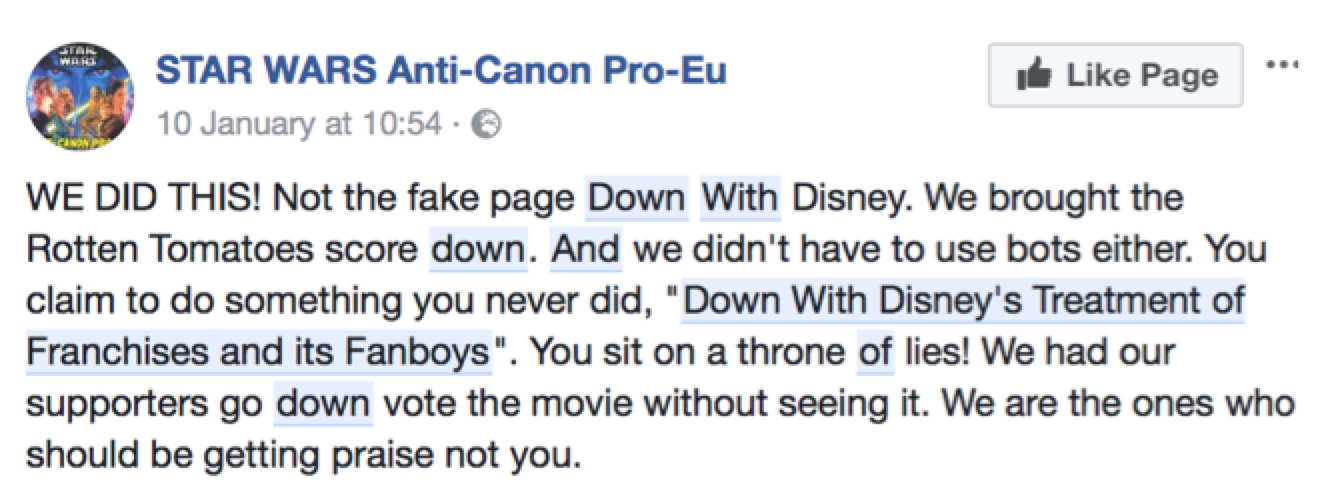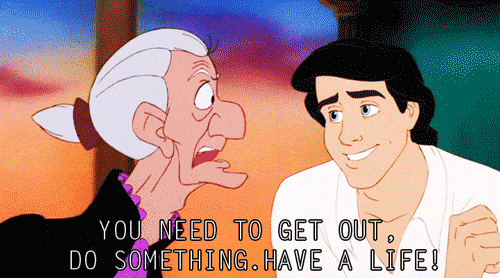Disney's Star Wars: Episode II - Attack of the Groans
/By William Proctor
Following the world premiere of Rian Johnson’s The Last Jedi in December 2017 - and with a review embargo in place - social media carried the celebratory chorus of joy and jubilation, perhaps best exemplified by this tweet:
A few days later, with the review embargo lifted, critics mostly joined in the chorus of celebrations: “an explosive rush of spectacle,” “fun and funny with emotional heft,” “quintessentially Star Wars and richer than anything else that has come before,” “will leave fans beaming with surprise.” Some critics, however, were less than impressed, and swam against the tide: “a work that’s ironed out, flattened down, appallingly purified,” “a disappointment,” “an untidy, overlong story,” “ranks closer to the Attack of the Clones gene pool” (ouch!).
As news surfaced about the Rotten Tomatoes score — now a highly anticipated event itself, a sad indictment of our “culture of consensus” — commenters, bloggers and journalists rushed to the organs of social media to investigate the radical asymmetry between critical spheres and user-generated reviews. The audience score being so out-of-alignment with the rapturous critical reception was cause for alarm, because, heaven forbid, this simply can’t be accurate because, well, Star Wars (as if expecting that critics, audiences and fans would agree to an interpretative consensus in any case). Of course, one could feasibly ask: so what? It’s not the first time that the critic-audience ratio has been disjointed, nor the last (I am thinking here about Netflix’s Bright being slammed by critics, hailed by audiences, with hardly a spark of conflagration). I am sure that readers understand the issues with “meta-critic scores,” but it is remarkable, I think, how Rotten Tomatoes has grown into such a powerhouse of opinion regarding the judgement and evaluation of culture.
Then, it all became clear as kaiburr crystal: the Rotten Tomatoes score had been infiltrated by trolls and 'alt-fans,’ torpedoing The Last Jedi as protest against 'politically correct' equality and diversity. As with my last essay, I am not suggesting for a minute that there are no reactionary responses to The Last Jedi. They are relatively easy to find if one goes looking and I won’t participate in amplifying such rhetoric (a point I shall return to below). But as I continue analysis of dedicated hashtags, as well as other discursive arenas including customer reviews on Rotten Tomatoes, the vast amount of commenters decrying the film as a weak entry in the franchise are centring their criticisms on plot, narrative, character, and canon, or simply to slam the film in no uncertain terms – and overwhelmingly so. This is not to imply a harmonious digital environment, not by any means; commenters have often been vehemently hostile, as the battle-lines between ‘pro’ and ‘anti’ constituents are drawn with each side actively batting insults back-and-forth; either across social media, or via the dissemination of memes criticising the film’s various failings (a selection of which pepper this essay). Interestingly, the ‘pro’ lobby have been propping up their defences by invoking institutional authority – such as Rian Johnson citing (non-canonical) EU material as precedent for certain creative decisions -- while the ‘anti’ lobby have re-activated George Lucas’ authorship, with some even go as far as to summon the prequel trilogy – at one time, the ultimate ‘bad’ object in Star Wars fandom – as a yardstick which to bash ‘Ruin’ Johnson, Disney, and The Last Jedi with:
“Help us George Lucas you’re our only hope.” “You were supposed to save the saga, not leave it in darkness.” “Jar Jar Binks sleeps well tonight.”
In the main, however, it seems that there is little space to dislike this film without being described as a racist, fascist, misogynist, hate-monger, or a ‘crybaby,’ and providing a counter-narrative that aims for a more accurate, nuanced portrait is lost in the fog of what amounts to little more than professional gossip at this point. Of course, nuanced counter-narratives don’t usually lead to an avalanche of clicks, "likes," tweets, re-tweets, posts and reposts, as questionable 'news' is launched out of the starting blocks and disseminated around our various social networks.
Statistically, hashtag publics, such as #notmystarwars and #notmyluke, certainly contain a minor selection of hateful comments, but, by my reckoning, these amount to less than 3%. After coding over 200 audience reviews from Rotten Tomatoes into discursive clusters — a small sample at this point admittedly, but one which I’ll continue to drill down over the coming weeks and months — over 96% critique creative decisions in the film whereas less than 3% mention people-of-colour, women, and the PC-inflected agenda of 'social justice' Disney. If Rotten Tomatoes were the sole outlet carrying scathing reviews, then that would be another thing entirely and certainly worthy of keen investigation. However, the sheer wealth of negative utterances unfolding across digital spaces is, I believe, worth drilling into further rather than piggybacking on press discourse without testing claims.
Nonetheless, numerous outlets claim that the most vocal fans on social media are right-wing tyrants out to sink Star Wars, if such a thing is even possible at this point (although a recent Wall Street Journal story claims that Disney aren't satisfied with the global haul of $1.3 billion as it failed to meet economic forecasts). Writing for The Huffington Post, Bill Bradley states unequivocally: “The Alt-Right takes credit for ‘Last Jedi’ backlash” (note the use of language normally reserved for terrorist attacks, as if one person on Facebook is akin to Al Qaeda with the Rotten Tomatoes score being “review-bombed” by terrorist groups). Tapping into this ‘source’ further to examine the claims made by this single, Facebook poster — who is clearly and unquestionably espousing right-wing politics, as well as being a notorious troll in the community having been ousted from various forums for his toxic behaviour — took a little more than twenty minutes to complicate, or even debunk outright, the anonymous poster’s claims. (Incidentally, it wasn't difficult to track the person's real identity, and his "proper" Facebook page includes no material of this kind.)
First, at no point does the poster mention the term 'alt-right,' nor does he claim to be a part of a wider 'movement' despite Bradley writing that the person is a “self-identified member of the alt-right.” (I won’t go into the way this constructs an image of the so-called 'alt-right' as a unified group compromised of ‘members’). The ‘alt-right’ connection is entirely invented by The Huffington Post writer, although one could reasonably argue that online right-wing statements are automatically awarded ‘alt-right’ status in the current political climate). The post used as source material for Bradley’s article is grabbed from ‘Down with Disney’s Treatment of its Franchises and its Fanboys,’ an open Facebook group ran by one, anonymous individual. It is not the so-called ‘alt-right’ that are taking credit at all but one, single Facebook user, and not, as Variety claim, “an alt-right fanboy group,” or, as The Washington Post said, “a men’s right’s activist” (readers will no doubt see what's going on here as the news tumbles across cyberspace).
Second, the post has 260 comments, 99.8% of which mock the poster with colourful epithets and insults. But what is also interesting is that another Facebook group, ‘Star Wars Anti-Canon Pro-EU’ – EU referring to the Expanded Universe that Disney dumped in 2014 – attack ‘Down with Disney’ for his vaunted claims:
“We both did it,” replied ‘Down with Disney.’
Of course, including such responses in news stories would significantly shift the terms of discourse and, at the very least, raise important questions regarding these types of claims. Is it plausible that Star Wars fans, especially pissed off EU fans, would turn to Rotten Tomatoes to write negative reviews as a sign of protest? Undoubtedly. But all that really tells us is that Rotten Tomatoes is in no way an accurate barometer of public opinion, especially given the methodology employed to 'measure' critical perspectives via the construction of parochial binaries between ‘good’ and ‘bad,’ or, more accurately, between ‘fresh’ or ‘rotten.’ (How about moving to a spectrum of vegetable-based criteria, such as ‘fresh,’ ‘ripe,’ ‘edible,’ stale,’ and ‘rotten’?) Is it at all likely that negative commenters could mask racism and misogyny with more text-based criticisms? Absoutely. Yet as Whitney Phillips and Ryan Milner point out on this very blog, “not knowing who created what, what the(se) creator(s) meant to accomplish, or what a given text “really” means, forces one to stay empirical and focus on the things that can be known and confirmed.” However, the so-called 'alt-right' are not known for deliberately masking ideological scripts as a way to penetrate public discourse — indeed, quite the opposite: provocation and VOLUME is the modus operandi of right-wing trolls, not surreptitious disguise and tip-toeing.
Third, given the questionable status of the source drawn upon by Bradley, I have to admit to being quite troubled by the way in which 'news' is spread across cyberspace, regardless of the veracity of content. That said, it seems that the flashpoint for The Huffington Post’s article came from another website, Deadline, which was cited later by Polygon, who carried the story about ‘Down with Disney,’ except with a significant difference: there is no mention of the so-called ‘alt-right.’ Written by Julia Alexander, the Polygon article describes ‘Down with Disney’ as a “pro-DCEU [DC expanded universe] community, announced on Facebook that it had generated trolls to review-bomb The Last Jedi’s score on Rotten Tomatoes.” The article then moves to consider that 4Chan could be behind the “attacks,” despite the (again) lack of evidence or community-members who claim otherwise. At the end of the piece, an update is published: “After reports of the attack being organized by a right-wing group began to circulate, a Rotten Tomatoes representative told Polygon that its security team and database experts "haven’t determined there to be any problems.”
Of course, if true, that only means that bots were not used to bomb the site; it is entirely plausible that some fans did indeed converge on Rotten Tomatoes to express their chagrin about The Last Jedi (not that there’s anything wrong with that in principle). Though, if this is so easy to achieve, then it also provides the same affordances for the ‘pro’ lobby to rank the film more positively on the site too, and there is no evidence of that kind of activity hitherto (nor is there any evidence at this point that the Rotten Tomatoes score has been infiltrated by ‘alt-right’ insurgents). Writing for the website, Inverse, Corey Plante described the news as little more than “rumour,” and queried the claims by speaking to ‘Down with Disney,’ who, yet again, could not supply evidence of bot-attack except in the vaguest terms ("a friend helped me"). Said Plante: “online metrics and vocal Facebook pages claiming to have all-powerful hacking bots are no match for a little bit of perspective on your side.”
So, in order for the “regime of truth” around The Last Jedi to continue, then certain counter-claims need to be disavowed or ignored entirely whereas any reasonable objections are buried amidst the online avalanche. In relation to ‘Down with Disney,’ a Rotten Tomatoes representative claimed that there is no indication that ‘bots’ have invaded the site so as to bring the audience score down. “The number of written reviews being posted by fans is comparable to TFA,” s/he said, although given that TFA was also criticised for being social justice propaganda by Men’s Rights Activists (MRAs) site Return of Kings – as well as their outlandish claims that they successfully boycotted The Force Awakens and cost Disney a few million -- we can take this as an indication of precisely, well, nothing. The representative went on to say that, “the authenticity of our critic and user scores is very important to Rotten Tomatoes and as a course of regular business, we have a team of security, network, social and database experts who closely monitor our platforms.” (Naturally, we should believe the anonymous Facebook troller and completely disregard everything else that doesn't fit the narrative, it seems.)
Let me put it another way:
1. A single individual claims that he sank the user-generated score on Rotten Tomatoes, which is, of course, unsubstantiated in any way.
2. 260 commented on the post, mocking him for espousing hateful rhetoric and extravagant claims, while often employing reactive aggression themselves (some of which could equally be described as hate speech).
3. Bill Bradley ‘discovers’ the post, perhaps following both Inverse and Polygon articles, viewing it as clear evidence that the ‘alt-right’ is wholly responsible for the user rating on Rotten Tomatoes.
4. Then conducts a brief conversation with ‘Down with Disney’ via Facebook messenger.
5. This is then pulled out of the shadows and into the media spotlight.
6. The article does not contextualise the comments below the post, which demonstrates that other Facebook-users are overwhelmingly critiquing ‘Down with Disney’s’ claims and ideological standpoint.
7. Then, the article gathers steam and gains significant traction across a litany of news outlets, professional, amateur and pro-am (NME, Variety, Forbes, The Hollywood Reporter, The Washington Post, Slash Film, and many more).
8. This is then disseminated, shared, tweeted, and re-circulated by readers, thus successfully participating in lifting marginal instantiations into mainstream prominence despite the lack of legitimacy, empirical merit or basic fact-checking.
9. This spirals and cascades across cyberspace whereby it mushrooms into unequivocal 'fact,' as demonstrated by a video on MSN which creatively juxtaposes ‘Down with Disney’ with an image of white supremacists sporting ‘Make America Great Again’ caps (see image below), as well as leaving no room for manouvre: “the group played a significant role in giving The Last Jedi a 54% user-score from over 100,000 reviews.”
10. Thus, a single individual has multiplied into a plural 'organisation' and managed to move from internet obscurity and into public discourse.
That one anonymous person on Facebook managed to spark a discursive ruckus should, I think, be a cautionary tale. That is, if this is the only evidence that the so-called 'alt-right,' or anyone else, is behind the Rotten Tomatoes score, then I would argue that audiences themselves have certainly participated in building up the “regime of truth” around The Last Jedi, and awarded prime space and valuable oxygen to a single individual trolling on Facebook, playing right into his hands. The internet maxim, “don’t feed the trolls” becomes more like offering Mogwai a banquet during the post-midnight hours.
To be clear: I am not suggesting that news organisations, blogs and so on, shouldn't be reporting on the activities of the radical right; instead, I am saying that journalists and entertainment commenters, etc., need to do better and cease constructing narratives that feed the flames of indignation when the fuel source is running low. For if, at times, (cheerleading) fans unintentionally conduct free labour on behalf of corporate organisations, then it stands to reason that fans — and coalition audiences — that share trumped-up news stories (no pun intended) actively perform labour on behalf of the radical right, even as they hold up these examples to mock and rebuke. I'm sure that this will be read as a provocation and, in many ways, it is meant to be. Things are rarely so simple, after all
(As a comfortable Marxist and trade union activist, I am certainly one who believes in 'No Platform for Racists and Fascists.' Why award a democratic platform to those who want to attack democratic values and ideals in any case?)
*NB: In early February 2017, 'Down with Disney' was removed from Facebook. This led to another discursive avalanche legitimising the earlier claims of "alt-right" status, while turning to protest Marvel's Black Panther by asking people to review-bombing Rotten Tomatoes (one may wonder where his bots have gone). There are now over fifty news articles and blog posts doing the rounds, all of which are centred on 'Down with Disney' as, by now, an authentic so-called 'alt-right' group. By tracking and mapping the discourse, then, one can see quite clearly how controversy is not only manufactured, but the way in which it can spread like wildfire, with journalists, bloggers, news anchors, social media users, fans and coalition audiences providing spark and kinder as well. To be clear again, this is not to say that right-wing activity should not be reported at all — rather, that constructing anonymous user-generated material as evidence of right-wing activity, without doing adequate leg-work and research, is risible, to say the least. After close analysis of 'Down with Disney,' I reported the page to Facebook on 24th January 2017, citing hate speech as rationale. Whether or not that led to the page being shutdown is difficult to ascertain — I was informed that the page did not break any community standards, so it's more than likely that another reason presented itself.
Many critics are unable to accept the possibility that The Last Jedi could be loved and hated simultaneously by "the people":
It became clear for the world to see that something was seriously amiss when a huge discrepancy opened between the critical and audience scores for the movie on Rotten Tomatoes. Critics largely showered it with praise, while registered moviegoers gave it a failing grade; right now, it stands at 91 percent "fresh" from professional film critics, but has just a 50 percent audience score. The gulf is an anomaly, which we know both because moviegoers gave largely positive assessments of the film to the polling firm ComScore and because a member of an alt-right fan group proudly told HuffPost that dissatisfied fans sent bots to deliberately lower the Tomatometer.
Here, we clearly see the will to homogenize, emphatically rejecting the lack of clear-cut consensus as evidence of right wing activity. Moreover, the polling firm ComScore being upheld as proof that “something was seriously amiss,” alongside activating the Huffington Post news story without qualification demonstrates an eager willingness to surround The Last Jedi with narratives of praise and fawning, while rubbishing the majority of negative commentary as primarily the work of either the so-called 'alt-right,' or, to a lesser extent, MRAs.
(As an aside, I wouldn’t mention polls to Democrats or Labour voters, or to Theresa May or Hilary Clinton.)
In addition to this, news emerged that a ‘de-feminized edit’ of The Last Jedi has been uploaded to illegal torrent site, The Pirate Bay, that cuts all women out of the film leaving the running time a sparse 45-minutes or so. Bearing in mind that one would have to go searching on an illegal site to discover the offending article, not to mention that this was in no way public knowledge at this point, and then bringing it out of the shadows and into mainstream prominence is a worrying turn, I would argue. Then, the news story was shared on Twitter, copying in director Rian Johnson, who then responded with his own tweet decorated with laughing emoticons, a sentiment replicated by John Boyega and Mark Hamill as they joined in mocking the anonymous uploader who, as many news reports claim, is a member of the MRA movement. Forgetting for a moment that nobody knows who uploaded the video at this point – no-one has claimed ‘credit’ on this occasion -- this is, at the very least, somewhat of a stretch, and encourages the spread of conspiracism within mainstream discourse. Writing for The Guardian, Martin Bellam explained his decision to run the story in below-the-line comments:
The news is that Mark Hamill and John Boyega were laughing at it. I wouldn’t have covered it otherwise. I think it’s significant that the stars of Star Wars are prepared in public to push back against the agenda of people who don’t like diversity in sci-fi/ fantasy...I have to say that since covering #GamerGate and Sad Puppies etc over the last few years ignoring these views doesn’t make them go away. I think it’s important to bring to people’s attention that these unsavoury misogynistic and racist views exist among fandoms of things we love.
So, it is ‘important’ to hunt for sexist/ racist commentary, be it a Facebook post, or an uploaded edit, both of which remain anonymous, then to write a story citing this as evidence of reactionary fanboy revolt, which is then disseminated across social media and other organs of cyberspace, for creative agents to mock, thus encouraging the ‘twitterati’ to follow suit (I'm also not quite sure how a tweet swamped with emoji's is 'pushing back' in any case). As with ‘Down with Disney,’ it is entirely possible that this was a trolling operation, and, if so, the trolls are indeed dining well this evening (albeit, two of them). The ‘alt-right’ and MRAs are (lo and behold!) responsible for negative criticisms of The Last Jedi because of two, anonymous individuals either trolling on Facebook, or uploading an edit on Pirate Bay? That’s some mighty fine work, circulating hateful screeds based on nothing but imputation and conjecture. That Johnson, Boyega and Hamill cajole the anonymous uploader may demonstrate their willingness to push back against reactionary current – as well as, let us not forget, amassing cultural capital along the way -- but only because this was pulled out of obscurity and given life in the first place. Of course, it is entirely possible that users would have found it anyway, but that’s not the point. I strongly believe that we need to ask questions about the veracity and validity of news stories before sharing and disseminating across our various networks. It seems as if there is a need to prove unequivocally that right-wing agents are partly, if not wholly, responsible for the backlash against The Last Jedi.
What is interesting is that Johnson’s emoticon mockery was then taken up by Twitter users, and led to a long thread of narratives, many of them performing aggressively by constructing anti-fans of The Last Jedi as MRAs, as “sexless heathens,” “snowflakes” (or “salty broflakes”), “fragile,” “unemployed and living in parent’s basement,” members of the “micro-penis support group,” “the word men is wasted on these fools,” “men who never got laid in their life or men who never experienced an orgasm,” “butthurt man babies,” that “die hard Star Wars bros have been editing women out of their life for years,” and so on and so forth. Users that questioned the claim that this anonymous uploader was indeed a member of the MRA movement were largely ignored (as were the criticisms within the hashtag #blackstormtrooper that queried press discourse):
“The assertion that the editor is an MRA appears completely baseless and the whole thing is almost too perfectly cringeworthy to be believed. Smells like fabricated clickbait.”
“I’m still waiting for proof it was actually an MRA.”
Instead,
“Oh my god can we just like a damn movie without a bunch of fragile asshats pitching a dam fit over nothing. I loved the movie. My family loved the movie. I can’t wait for the next movie.
“The fact the director and many actors jumped on board is also pretty freaking hilarious. The MRAs man-babies are soooo petty.”
As with ‘Down with Disney,’ then, one anonymous person managed to spark a chain of discord without much effort whatsoever. On this occasion, the Twitter feed begins by attacking the anonymous uploader, and then progressed to general claims about “die-hard Star Wars fanboys” (always gendered male, but now homogenised as well). By the time that Sky News picked up on the outrage, it is distorted again: “the editor describes himself as a Men’s Rights Activist” (false), and that the “chauvinist cut” trims 46 minutes off the film’s running time (false – it was trimmed down to that length). Although one may argue that I am nit- picking here, it should at least demonstrate that the digital echo-chamber often operates like a game of "telephone" or "rumours" (depending upon your geography), whereby basic facts become embroiled in spurious misinformation.
I won’t cry “fake news,” not least because of "he-who-shall-not-be-named," but there is something profoundly troubling about this, not simply for Star Wars, but for the way in which news is disseminated and shared without consideration for the merits of content. As Claire Wardle puts it:
"By now we’ve all agreed the term “fake news” is unhelpful, but without an alternative, we’re left awkwardly using air quotes whenever we utter the phrase. The reason we’re struggling with a replacement is because this is about more than news, it’s about the entire information ecosystem. And the term fake doesn’t begin to describe the complexity of the different types of misinformation (the inadvertent sharing of false information) and disinformation (the deliberate creation and sharing of information known to be false)."
Wardle’s preferred term, ‘information pollution,’ is something that we should all be concerned about as we traverse the vast expanse of the digital hemisphere. More than this, however, is the way in which the creation and dissemination of meretricious news, however much they might fulfil our world-view, conducts cultural and ideological work on behalf of the radical right by over-amplifying hateful rhetoric, especially when certain news stories are specious at best. In actual fact, the Associated Press and other journalist bodies have all but banished the use of the term ‘alt-right,’ except when citing direct quotes (which should always either be in quotations or with the qualifier, ‘so-called’). However, many of the outlets that carried the story afterwards, which includes reputable outlets, reproduced and recirculated the political noun incontestably.
Writing for Wired, Issie Lapowski argued that “[t]here’s no right approach to covering this growing movement, but one thing is certain: the press has erred on the side of over-exposure.” Within the article, author and analyst, J.M Berger, who studies political extremism, said: “there’s not really room for debate about cutting off the oxygen to the movement through more measured media coverage.” The mainstream media “gives amplification to the groups, then the groups use violence even more,” said Jason Stanley, Professor of Philosophy at Yale University.
In a more thoughtful article for syfy.com, Jordan Zakarin points towards mainstream news media’s complicity in airing extreme right-wing perspectives (although the piece also indisputably presents the Facebook and Pirate Bay news as evidence of so-called 'alt-right' and MRA involvement). Obviously, if one dips their toes into the shark-infested digital networks popularized by figureheads such as Alex Jones, Ben Shapiro, and white nationalist Stefan Molyneux, then you would intimately know that it is not safe to swim in those waters without being bitten, chewed upon, swallowed whole. For George Hawley, Professor of Political Science at Alabama and author of Making Sense of the Alt Right,
"Going on the offensive against a well-known movie or artist is a way to generate angry articles from the mainstream media…And for small movements that thrive on negative coverage, getting mentioned at all counts as a win. It works even better for them in cases where a large number of people genuinely dislike a particular cultural product already for non-racist or misogynistic reasons — as was the case with the new Ghostbusters.”
In actual fact, it has become increasingly difficult in the current climate to criticise films such as the Ghostbusters reboot, Wonder Woman, and, yes, Star Wars, without being viewed as masking something rotten percolating within the body politic, although in some ways, it is understandable — the cacophony surrounding these films is, by and large, orchestrated by mainstream media.
There is no doubt that extreme right-wing factions have attempted to hijack popular culture over the past few years or so, and shift the grounds of discourse in their favour; or, at least, to turn up the decibels so as to LOUDLY gate-crash the mainstream (“getting mentioned at all counts as a win”). But this also needs to be examined to determine what impact they’re having through multiple so-called boycott campaigns. As I have written for the forthcoming Popular Culture and The Civic Imagination (edited by Henry Jenkins, Gabriel Peters-Lazaro, and Sangita Shresthova), the majority of these protests are given life by mainstream outlets and actively serve the cause that they’re critiquing by over-amplifying such rhetoric. Boycott Stephen King’s IT (‘highest-grossing horror film of all-time’). Boycott The Force Awakens (‘top-grossing domestic film in history,’ ‘fastest film to pass the $1 billion goldmark,’ and the third film in cinema history to pass $2 billion). Boycott Wonder Woman (‘biggest box office hit by a female director,’ and smashing six more records during its theatrical run).
Economically, then, it seems as if the boycott protests have failed miserably. Ideologically, however, the so-called 'alt-right' and MRAs may view this as a win having managed to cause at least a modicum of online mayhem without actually trying; while simultaneously facilitating the spread of ideological currents above and beyond what they would be capable of achieving off their own bat. It is not solely ‘the mainstream media’ to blame, however: we also need to take responsibility for the way in which content is circulated and re-circulated across our digital networks, and our everyday lives as well. There is quite enough right-wing sentiment online as it is without participating in manufacturing controversy. I say this in the spirit of academic debate.
In the final part of this trilogy, I will discuss the return of ‘Get a Life’ stereotyping in press and fan discourse.
Perhaps it never quite went away at all.
Dr William Proctor is Senior Lecturer in Popular Culture at Bournemouth University, UK. He has published widely on numerous topics, including Batman, James Bond, One Direction, The Walking Dead, Stephen King, and Star Wars. William is a leading expert on reboots and is currently finishing up his debut monograph, Reboot Culture: Comics, Film, Transmedia, for Palgrave Macmillan. He is co-editor of Transmedia Earth: Global Convergence Cultures with Dr. Matthew Freeman (Routledge, 2018); co-editor of Disney's Star Wars: Forces of Promotion, Production and Reception with Dr. Richard McCulloch (University of Iowa, forthcoming); and co-editor, alongside Bridget Kies, of the themed-section of Participations: International Journal of Audience and Reception Studies on "Toxic Fan Practices" (May, 2018).


